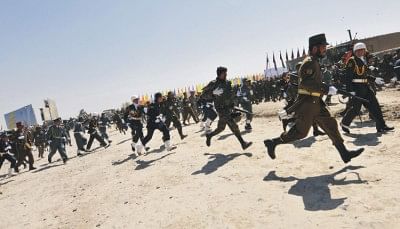Just another bomb blast in Afghanistan

Photo: AFP
I first read about this in the on-line edition of the New York Times. The early report did not have a full count of the casualties. The headline, which vastly under-reported the number of dead, said simply: "26 dead in Afghan suicide blast."
The first paragraph was a repeat of news items about Afghanistan that I had become so familiar with:
"A suicide attacker threw himself at a delegation of lawmakers visiting a town in northern Afghanistan on Tuesday, killing as many as 26 people, including a leading opposition figure, and wounding scores more, local and regional Afghan officials said."
Sad though it may seem, I had become used to such dispatches from Afghanistan. It was just another bomb blast in Afghanistan, I thought, and was about to move on to other stories.
The next paragraph, consisting of a single sentence, drew my attention: "Many of the victims were schoolchildren performing at a welcoming ceremony."
I started having the same thought that has haunted me ever since I came to know this beautiful but unfortunate country: when will this all stop?
And where were the leaders who could ensure that Afghans are forever spared such tragedies? Karzai was clearly failing and the old warlords could not be trusted. My thoughts then drifted towards Sayed Mustafa Kazemi.
A strikingly handsome man, even by Afghan standards, Mustafa Kazemi was Afghanistan's commerce minister when I first met him in early 2004. I had walked into his room with the usual trepidation you have when meeting a minister.
The interlocutor, either a fellow World Bank staff or an official of the Commerce Ministry -- I do not remember exactly now -- introduced me as Syed Mahmood (the name that I was known by at my work place in deference to the western practice of using one's first name).
Suddenly, Mr. Kazemi's eyes opened up, his smile became broader, and as his hands clasped mine in one of the warmest handshakes I have ever experienced, he repeated my name, with an extra emphasis on the word "Syed." I noted he was a Syed too, and that emphasis reminded me of something I had heard many years ago -- that Afghans have a special regard for "Syeds," believed to be people with a direct lineage to the Prophet.
That was my first visit to Afghanistan and the meeting took place on the third day of my visit. I was still unsure of things in this troubled and risky land. My wife had not wanted me to work in Afghanistan, having had her own worries about security compounded by the reactions of whoever she had mentioned my impending visit to: "What, Afghanistan?!" or "Does he really have to go there?!"
And it was not reassuring that within two hours of landing in Kabul, I had to go, with many other officials of international organisations making their first trip to Afghanistan, to a UN briefing session, where we learned not about the culture and literature of Afghanistan but about the different sizes and shapes of car bombs.
But Kabul was a warm place. The snow-capped mountains in the distance, the bright sunshine, the crowded streets and, above all, the friendliness of the people, kept telling me that it can't be all that bad. But the meeting with Mr. Kazemi was the tipping point -- his warm hand-shake and the emphasised mention of my first name made me feel immediately at home. The subsequent discussions got me excited about Afghanistan's future.

 For all latest news, follow The Daily Star's Google News channel.
For all latest news, follow The Daily Star's Google News channel. 



Comments